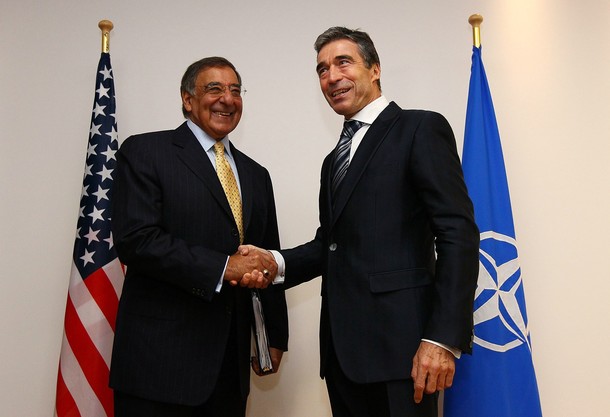
From Leon Panetta, U.S. Department of Defense: We are nearing the end of a successful campaign in Libya, and are closer than ever to achieving our shared goals in Afghanistan. But there is no doubt that this is also a time of challenge to the alliance. The international security environment is complex and is rapidly changing. Our nations are grappling with significant budget challenges, putting new pressure on defense spending that has already been in decline here on the continent. But that cannot be an excuse for walking away from our national security responsibilities.
This fiscal environment means that the United States, and all nations in NATO, must depend on their fellow members even more – even more — to share the burden of protecting common interests. But to do that, the alliance must remain strong – and that will require members to commit to addressing growing gaps in our military capabilities even as we confront the challenges of fiscal austerity.
Many on both sides of the Atlantic have recognized that we are at a critical moment for our defense partnership. My good friend and predecessor, Bob Gates, used his last policy address as Defense Secretary here in Brussels to deliver a strong message to Europe about the need to boost its commitment to defense and more equitably share the security burden with the United States. NATO Secretary General Rasmussen has also warned about the risk of a weak and divided Europe unless it invests in its own security. While these warnings have been acknowledged, growing fiscal pressures on both sides of the Atlantic have I fear eroded the political will to do something about them. I am convinced, having played a role on budget debates in the prior times I worked in the Congress, as OMB Director, and as Chief of Staff, I am convinced that we do not have to choose between fiscal security and national security. But achieving that goal will test the very future of leadership throughout NATO.
Despite this challenge, NATO continues to do its job and demonstrate its importance to its members, including the United States. As President Obama has said, this is the most successful alliance in human history. And I believe that to be the case. We depend on it every day to provide capacity that we cannot find anyplace else. . . .
While NATO’s efforts in Afghanistan and Libya show the necessity and effectiveness of the alliance, they also illustrate growing gaps that must be addressed. The Libya operation, for example, revealed significant shortfalls in capabilities. For example, NATO had a significant shortage of well-trained targeting specialists, and the United States had to make up the difference by deploying more targeters to determine the targets to be struck. In addition, shortages of supplies and munitions plagued the effort – forcing the U.S. to sell millions of dollars of ammunition, repair parts, fuel, technical assistance, and other support items simply to keep the operation going. But nowhere were the gaps more obvious than in the critical enabling capabilities: refueling tankers, provision of intelligence, surveillance, and reconnaissance platforms such as Global Hawk and Predator drones. Without these capabilities, — without these capabilities — the Libya operation would have had a very difficult time getting off the ground or been sustained.
Meanwhile, Afghanistan has revealed its own set of challenges. General Allen still lacks trainers – something that we all know is critical to this phase of the transition. He also continues to seek contributions to the trust funds we have collectively established in recent years in order to sustain the Afghan National Security Forces, something that is essential to their ability to provide security now and in the future. And, as in Libya, the shortage of ISR and enablers – in particular airlift – has plagued the mission from day one.
Unfortunately, these capability gaps are being exposed at precisely the time when every defense minister in NATO, including myself, is dealing with great fiscal challenges at home. By one estimate, here in Europe, defense spending has dropped almost two percent annually for a decade – at a time when many European nations have been conducting operations in Afghanistan, Libya, Kosovo and elsewhere. As a result, much-needed modernization investment has been deferred. There are legitimate questions about whether, if present trends continue, NATO will again be able to sustain the kind of operations that we have seen in Libya and Afghanistan without the United States taking on even more of the burden. It would be a tragic outcome if the alliance shed the very capabilities that allowed it so successfully conduct these operations.
Excerpts from remarks by U.S. Secretary of Defense Leon Panetta at Carnegie Europe, Brussels. (photo: Reuters)
Image: reuters%2010%205%2011%20Panetta%20Rasmussen.jpg
